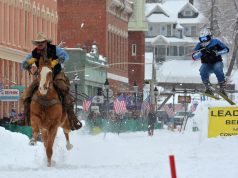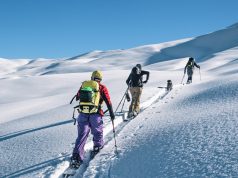
Andrew Johnson didn’t grow up dreaming about rodeos, let alone dreaming about becoming an international rodeo star. Rather, it was something of happenstance, something he claims he was pulled into by “the luck of the draw.”
For something that happens once, it’s possible, even likely, to admit luck played a part. But for something that happens twice, it doesn’t seem fair to credit luck quite as much.
Johnson, 25, of Denver, only jumped into the rodeo world in 2012 when he started going to Charlie’s Denver, a gay country bar. Now, a mere three years later, he wears two crowns: the first, Mr. Colorado Gay Rodeo (from the Colorado Gay Rodeo Association, CGRA), which he claimed in 2014, and Mr. International Gay Rodeo (from the International Gay Rodeo Association, IGRA) that was just awarded in early 2015.
Johnson — who is now the public relations chair for the CGRA — is a humble man with a clear voice that subtly grows more and more excited when talking about rodeo. Originally from Michigan, Johnson says despite his late introduction to the rodeo world, Western culture was never something foreign.
“I grew up with the whole aspect of country lifestyle: courtesy, respect, manners, those types of things,” Johnson says.
As a patron at Charlie’s Denver, Johnson met a lot of rodeo folk and admired many of them who upheld those same traditional Western values and coalesced in a nonprofit group, Men of Charlie’s, that fundraised money for local charities. One of their biggest philanthropic events was the Colorado Gay Rodeo Association. When the local bartender suggested Johnson compete in the 2014 rodeo, Johnson says the other members in the group supported the idea and inspired him to give it a try.
He says he appreciates the ability to give back to the community that holding a title provides.
Johnson likens the rodeo to the Miss America Pageant. There are five categories of competition: personal interview, Western wear, public presentation, entertainment and horsemanship. Contestants can register in one of four groups: Mr. (male identifying), Ms. (female identifying), MsTer (Drag King), and Miss (Drag Queen). The winners of the state competition, like Johnson, move onto the IGRA competition, standing against the other 20 associations across the country and Canada.
The IGRA was inaugurated in 1985, with the intent to allow all competitors — gay, lesbian, bisexual, transgender and heterosexual alike — to compete in rodeo events without discrimination. Regardless of sexual orientation or gender identity, the IGRA welcomes all as participators and spectators.
The CGRA is the oldest organization within the IGRA and holds the most IGRA pageantry titles. In 2007, Carolyn Herbert took home the first Drag King title and now serves as the CGRA’s vice president.
Herbert says the organization’s name shouldn’t be misleading.
“The fact that the word ‘gay’ is in the title doesn’t mean that you have to be gay,” Herbert says. “[‘Gay’] doesn’t define who we are, but it makes sure we don’t forget our history.”
This history is something the entire organization keeps close to heart.
“Some of the guys that [have been] with us from the beginning used to get a lot of strife from being gay, so leaving the word [in our title] reminds us of the trails they had to walk,” Herbert says.
In past years the organization has grown, noticing at least some progress within the rodeo community’s acceptance of individuals that do not fall on the traditional sexuality and gender spectrums. They note there is still more progress to be made, however.
The all-inclusive attitude is a central focus of this year’s rodeo, happening July 11 and 12 at the Jefferson County Fairgrounds. In particular, this year they are aiming to appeal to a younger demographic.
“We want to help educate the next generation to keep this alive,” Herbert explains.
“You don’t have a lot of the younger generations that grow up on ranches anymore. We’re trying to pull in the city kids and get them interested too.”
Next year the CGRA is planning to run a rodeo school, where they will invite everyone out to learn the basics of rodeo events. It’s important to CGRA that new and younger folks learn rodeo skills because they believe this will invigorate and further bolster their community.
“In past years it’s been the same day in day out… [dominated by] the older folk that established the gay rodeo,” Johnson says.
Yet this year the CGRA — now in its 33rd year — has seen a rise in the 23- to 27-year-old registration pool and are expecting a growing number of young people to compete. Johnson won’t be competing this year in order to leave more room for new contestants and enjoy the event.
Herbert explains that while 30 years ago the rodeo’s focus to provide a safe place for gay individuals to “do what they want to do safely” was important, now the rodeo has come “full circle… and we have to show people that we can be kid friendly too.”
Johnson encourages the whole family to come out and watch.
“It’s something out of the norm — not your everyday rodeo. It’s something that you can bring everyone to. There are different aspects that bring excitement for everyone,” he says.
At the rodeo you can expect many typical rodeo events, like elaborate horse shows and bull rides, but with a twist to include traditional gay events like drag shows and entertainment. Women compete in all the events, including bull and bronc riding, which are reserved for just men in traditional rodeos. This year there will also be a live concert featuring Jonathan Willey on Saturday night after the competitions.
“The thing that makes our rodeo different from others [is that] no matter what you look like, no matter who you are, no matter what you are, nothing matters,” Johnson says. “We have everything from transgender, drag queens — everyone, really anyone.”
Goat dressing is the most popular event, according to Johnson. In this event two individuals sprint across the ring to a goat, put whitie tighties underwear on the animal and then sprint back.
“Anyone can do it. We like to encourage kids especially,” Johnson says. “This year we want to boost community goat dressing to make it more open to the public and try and get everyone involved.”
Even without any kind of previous rodeo experience, Herbert still recommends going to watch.
“We can teach you everything as you’re sitting in the grandstand. And that way, as you’re watching, you know what they’re doing instead of just sitting there not knowing what is going on,” Herbert says.
But most of all, Herbert adds that fun is the most important aspect when attending a rodeo.
Despite the fact that he’s not competing, Johnson says he still has some goals for this year, but one stands out among the others.
“[Promoting] that rodeo is a community — it’s not just for a stereotype.”














